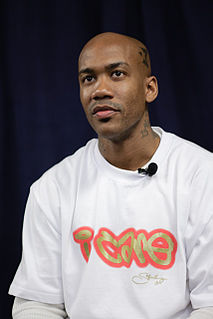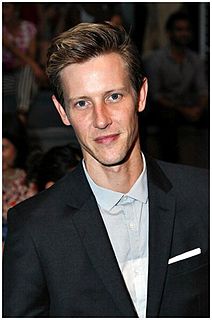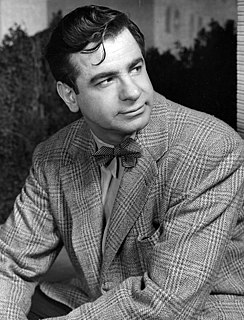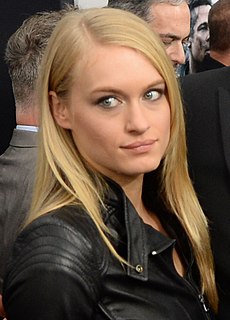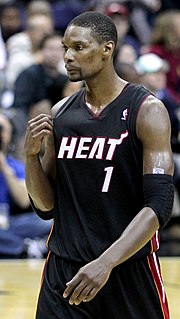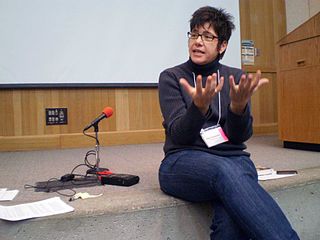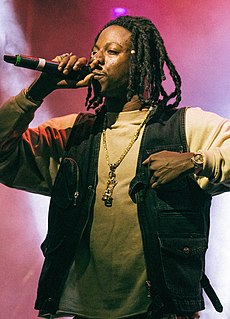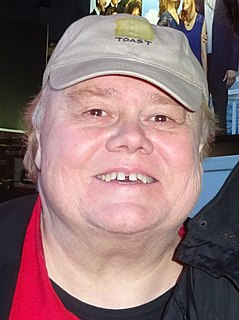A Quote by Ralph Fiennes
I have a great editor and I enjoy, in a masochistic way, being ruthless about my own performance. How do I know, but I think I'm quite good at saying, "That's no good. That's no good. That's it. That's it. That's good." And I'm with the editor who goes, "No, I think you're wrong. That's not your best." There's an initial point in the editing, if you're directing yourself, especially in my case, where you go, "Ouch, ouch, ouch, I can't watch this." And then, there's a point where you become hard-nosed and just take your neurosis away and go, "What's working? That's okay. That's okay. We can lose that, and lose that." You get objective about it.
Related Quotes
Don't get me wrong - I love Jason Kidd. He's a great point guard (But) how am I comparing myself to him when I think I'm the best point guard to play basketball? That doesn't make any sense. I mean, how can I sit here and compare myself to somebody if I already think I'm the best?I'm telling you what it is: I know I'm the best point guard in the NBA. I don't need anybody else to tell me that. When I go on the basketball court, if I think about what you're all saying, I'll lose my mind.
I know when I watch a film at this point, if I completely lose myself in the characters and the story and the world of the film I know that it's at least in my opinion, that was great. Otherwise I'm thinking: "Oh I know they were just doing A, B and C, right before they walked into the scene, then the camera was there, then they probably took the shot from this reverse close-up and moved it into this." When all of that drops away then I'm like: "Okay this was phenomenal, this was fantastic." I mean, any film or TV performance in general is probably good.
My last point about getting started as a writer: do something first, good or bad, successful or not, and write it up before approaching an editor. The best introduction to an editor is your own written work, published or not. I traveled across Siberia on my own money before ever approaching an editor; I wrote my first book, Siberian Dawn, without knowing a single editor, with no idea of how to get it published. I had to risk my life on the Congo before selling my first magazine story. If the rebel spirit dwells within you, you won't wait for an invitation, you'll invade and take no hostages.
I have the words "Lose Well" on my shoulder. It's kind of a catchphrase that sprung up from my TV show at some point. It's this idea that at a certain point, if you're a loser you've got to own that. It's pretty okay to strike out in life. Just get good at it and hold your head up high. If you're a loser, that's what you are and be cool with it.
I work a lot, and I prepare a lot. I think that's really important when you live in LA, to go the extra mile for whatever it is that you're trying to achieve. You realize out here that when you stop moving so fast, it's a lot harder than you thought. A lot of hard work has to go into your career, and preparation, and being your best at all times. I think you just have to always present yourself at your best, and you just need to be prepared all the time. Looking good, and feeling good, and being positive, and being in the right set of mind to accept whatever comes your way.
I think I'm a reporter's editor. Being a good reporter is a specific skill, one I admire and don't possess myself - I appreciate people who know how to ask the right questions, who are excellent researchers, who know how to assemble information, and I enjoy working with them to shape their information into an article. Good reporters tend to be receptive to editing, and to a more collaborative form of writing in general, and you always end up learning more from how they work than you expect you will.
Every day is still exciting. I have like a very good system worked out with my editor. Some directors are in there every day, sitting there in the room with the editor. I lose perspective incredibly quickly, and so what I do is I watch...I come in the room and give very specific notes and then I go back to my house or in my office and I watch the dailies.
You go from being with the guys all the time in the locker room, in practice, having a militarized brain in terms of this schedule, and then, all of a sudden, you are on your own. You lose a sense of purpose; you lose a sense of yourself. And you lose confidence. You find yourself saying, 'I was the best at this, and now I'm not the best.'
You can give the greatest performance possible, but if you don't have a director who's pointing the camera in the right direction and an editor who's editing it properly, it doesn't matter what you do. The director and the editor are the most important people. Not the actors. Sometimes the writer is important. But if you don't have a good director, you can't have a good production.
What makes a good editor is staying the hell out of the way as much as possible. ... If you're a DC or Marvel or Dark Horse or BOOM! editor who's assigning work, then if you did your job properly to begin with, then the people you've hired can be trusted to do what they do without excessive meddling. The ideal situation you're shooting for as an editor is to groom a collaborative creative team to the point where their work sails effortlessly through production and the most you have to do is fix the spelling and the commas.
You think to yourself, “If one drink feels really good and two feels really, really good, a hundred ought to feel fantastic.” As sane people know, it doesn't work that way. A hundred drinks feels terrible. Bad things happen. But the addict keeps at it, thinking at some point it's going to get good again The point is to not feel what you're feeling. The problem is, you become someone you never thought you would become, and you have no idea how you got there.
Treat your career like a bad boyfriend...
Your career wont take care of you. It won't call you back or introduce you to its parents. Your career will openly flirt with other people while you are around... You have to care about your work, but not about the result. You have to care about how good you are and how good you feel, but not about how good people think you are or how good people think you look.
On tour things go wrong all the time, I mean that's live music, that's what it's all about. I think one of the things I'm learning is that when stuff goes wrong, really brilliant musicians have the ability to turn this into something interesting and unique. I think good people in any sphere of anything know how to deal with problems, how to take it in your stride. We are learning this by touring, by being put in these positions when we need to focus and deal with it.
Your agent or manager tells you. They go, "You're out. They're gonna get a new guy." But then I didn't feel bad. I didn't take it personally. Not that I'm competitive at all. But you have pride in that, you know? You want your ratings to be good. But now that I'm 62, I don't really care about the ratings. I don't care about the reviews. I care about the work, and I care about the people that I'm working with, and I try to make the experience for them and myself as good as it can be.

